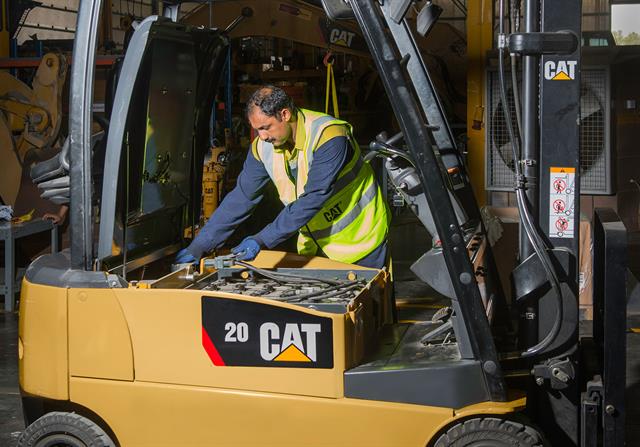 Most forklifts use traditional flooded lead-acid, but there are alternative 'sealed' types, known as valve-regulated lead-acid (VRLA) batteries, that don't need topping up with water. |
Question: what battery is better for an electric forklift truck: lead-acid or lithium-ion?
Answer: it depends...
Cat® Lift Trucks explains why lead-acid is usually the best choice - at least today.Power packs probedFirst, you need to know that not all lead-acid batteries are the same. Most forklifts use traditional flooded lead-acid, but there are alternative 'sealed' types, known as valve-regulated lead-acid (VRLA) batteries, that don't need topping up with water. Amongst those are some advanced ones which take lead-acid capabilities to new levels. Li-ion batteries, which require a sophisticated battery management system (BMS), are also sealed.
Energy efficiencyLi-ion packs tremendous energy into a small space and delivers sustained performance over long runtimes. Flooded lead-acid batteries are bulky but they're great at supplying high current for heavy duties. Apart from the more advanced models, VRLA batteries have less capacity. Energy costs are higher for lead-acid, especially in flooded batteries, as they need regular overcharging to stay healthy.
Charging and cycle lifeLead-acid packs have to be charged for several hours at a time. Recharging before they drop to about 20% of their capacity shortens their life, except for the most advanced VRLA units. These, like Li-ion batteries, can be opportunity-charged at any time - during lunch breaks, for example - without ill effects. Flooded lead-acid batteries may live a bit longer than VRLA, but not as long as Li-ion. On the downside, Li-ion batteries are harder to recycle.
Maintenance needsLi-ion and sealed lead-acid batteries are virtually maintenance-free. For flooded lead-acid, you can extend watering intervals with the right battery and charger - or think about an automatic top-up system. Flooded batteries need a special ventilated charging room, as they produce explosive gases. When stored, their cells lose charge and must be recharged every few months. The latest VRLA advances can increase this to two years, while Li-ion holds charge even longer.
The bottom lineSo, which is ideal for you? Li-ion gives very long life and high energy efficiency, with little or no need for battery changes and downtime. On the other hand, its price tag is much bigger and there are extra costs relating to its opportunity-charging stations. Right now, there are relatively few applications where Li-ion's savings outweigh its expense - although prices are falling...
These are just some of the factors to consider. For a more detailed comparison of battery types, go to
https://eurekapub.eu/technology/2019/07/15/power-pack-probe.
Cat® Lift Trucks
www.catlifttruck.com
Send an email
Youtube | Cat® Lift Blog